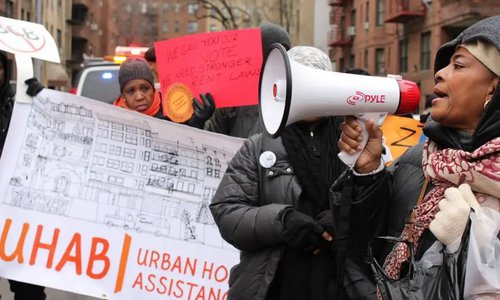David M. Greenberg
The Racial Justice Implications of TOPA: Seizing Preservation Opportunities
A new research brief from LISC Community Research and Impact empirically examines the potential racial equity benefits of COPA (Community Opportunity to Purchase Act) and TOPA (Tenant Opportunity to Purchase Act) policies and housing preservation strategies.

Empty Towers and Community Pillars: Addressing the Root Causes of Small Business Displacement
On Wall Street and downtowns around the country, declining in-person work is driving near-record office vacancies, with implications for nearby businesses, the urban tax base, and public services. But on main streets across the country, LISC is addressing some of the same technological and economic changes behind downtown vacancies, to support entrepreneurs of color facing displacement.
Stable Homes and Resident Empowerment
This report from the LISC Community Research and Impact team describes COPA and TOPA policies at work and their outcomes in DC and San Francisco, implementation lessons, and evidence about the impact of these policies based on preliminary LISC analyses of housing market dynamics in New York City.
Tenant & Community Opportunity to Purchase Policies
Implementation lessons and impact prospects for Tenant and Community Opportunity to Purchase Act (TOPA or COPA) policies.

LISC Leadership Series: Tenant Power, Private Equity, and the Eviction Crisis
Join LISC for a live webinar discussion hosted by Denise Scott, President of LISC, exploring how tenants are pushing for solutions to rising rents and evictions, and to address private equity’s role in exacerbating the nation’s housing crisis.
Medicaid as a Multiplier
This report from LISC Research & Evaluation shows how Medicaid can fund community interventions to improve the social determinants of health. The model is paving the way for community-based organizations to collaborate with hospitals and insurers to promote health equity and lower healthcare costs in the bargain.

Evictions and Profit vs. Home and Community
LISC's newest research report offers powerful evidence that racism, financial exclusion and disinvestment have paved the way for speculators to reap huge profits in neighborhoods of color. But there’s good news, too: Buildings with affordability subsidies are better maintained and remain protected from speculation.
Gambling with Homes, or Investing in Communities
LISC’s research report offers rigorous evidence that large landlords have reaped the greatest profits in communities of color, and that this speculation drives evictions and poor housing maintenance quality.
Reclaiming Vacant Houses & Preventing Foreclosure
A report from LISC and Urban Institute describes how a NY State law, proceeds from an Attorney General settlement with banks, and an initiative from LISC helped NY communities turn the tide on vacant and “zombie” homes and prevent future foreclosures.
Equitable Pathways to Small Business Recovery
A playbook from LISC and Next City that offers a framework for pursuing equitable pathways to small business success, and lays out contextualized strategies related to capital access, small business capacity, and commercial real estate.